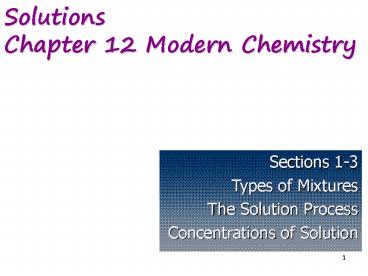Solutions Chapter 12 Modern Chemistry - PowerPoint PPT Presentation
1 / 17
Title:
Solutions Chapter 12 Modern Chemistry
Description:
Nonelectrolyte. Solute. Solvent. Solution. Vocabulary. Suspension. Tyndall Effect [Types of Colloids] ... A homogeneous mixture of two or more substances in a ... – PowerPoint PPT presentation
Number of Views:10803
Avg rating:3.0/5.0
Title: Solutions Chapter 12 Modern Chemistry
1
SolutionsChapter 12 Modern Chemistry
Sections 1-3 Types of Mixtures The Solution
Process Concentrations of Solution
1
2
Section 12.1
Types of Mixtures
Chapter 12 Section 1 Types of Mixtures p. 401-406
2
3
Vocabulary
Colloid Dispersed phase Dispersing medium
Electrolyte Nonelectrolyte Solute Solvent
Solution
Suspension Tyndall Effect Types of Colloids
Types of Mixtures
Chapter 12 Section 1 Types of Mixtures p. 401-406
3
4
TYPES OF MIXTURES
SOLUTE
SOLVENT
SOLUTION
COLLOIDS
SUSPENSIONS
ELECTROLYTES
TYPES OFCOLLOIDS
NONELECTROLYTES
DISPERSINGMEDIUM
DISPERSEDPHASE
Concept Map 12.1
TYNDALL EFFECT
4
5
Solution
- A homogeneous mixture of two or more substances
in a single phase - Particles are thoroughly mixed and remains mixed
indefinitely - Components of a solution
- Solvent does the dissolving the larger amount
- Solute is being dissolved the smaller amount
5
6
Liquid and solid solutes
6
p. 402
7
Solute-Solvent Combinations
- Solutes and solvents can be any state of matter.
- Look at page 402 for examples
- Alloys solid solutions of metals
7
p. 402
8
notes
Types of Solutions Image
Chapter 12 Section 1 Types of Mixtures p. 401-406
8
9
Gold and Gold Alloy Image
Chapter 12 Section 1 Types of Mixtures p. 401-406
9
p. 403
10
Mixtures That Are Not Solutions
- Suspensions particle settle out if not stirred
constantly large particle size - Comparing solutions, colloids and suspensions on
page 404
10
p. 404
11
Mixtures That Are Not Solutions
- Colloids
- Particle size between suspension soln.
COLLOIDAL DISPERSION
DISPERSED PHASEcornstarch
DISPERSING MEDIUMwater
11
12
Tyndall Effect
- Occurs when light is scattered by colloidal
particles dispersed in a transparent medium
12
13
Classes of Colloids
- Foams and emulsions are types of colloids.
- Table on page 404.
13
p. 404
14
notes
Emulsion Image
Chapter 12 Section 1 Types of Mixtures p. 401-406
14
15
Electrolytes Nonelectrolytes
- Electrolyte a substance that dissolves in water
to give a solution that conducts electric current
- Ionic compounds and highly polar molecules form
electrolytes - Nonelectrolytes a substance that dissolves in
water to give a solution that does not conduct
electricity
15
16
Electric Conductivity in Solutions
16
p. 406
17
Ch 12 Sec 1 Homework
Section Review Page 406 1-6
Chapter 12 Section 1 Types of Mixtures p. 401-406
17

